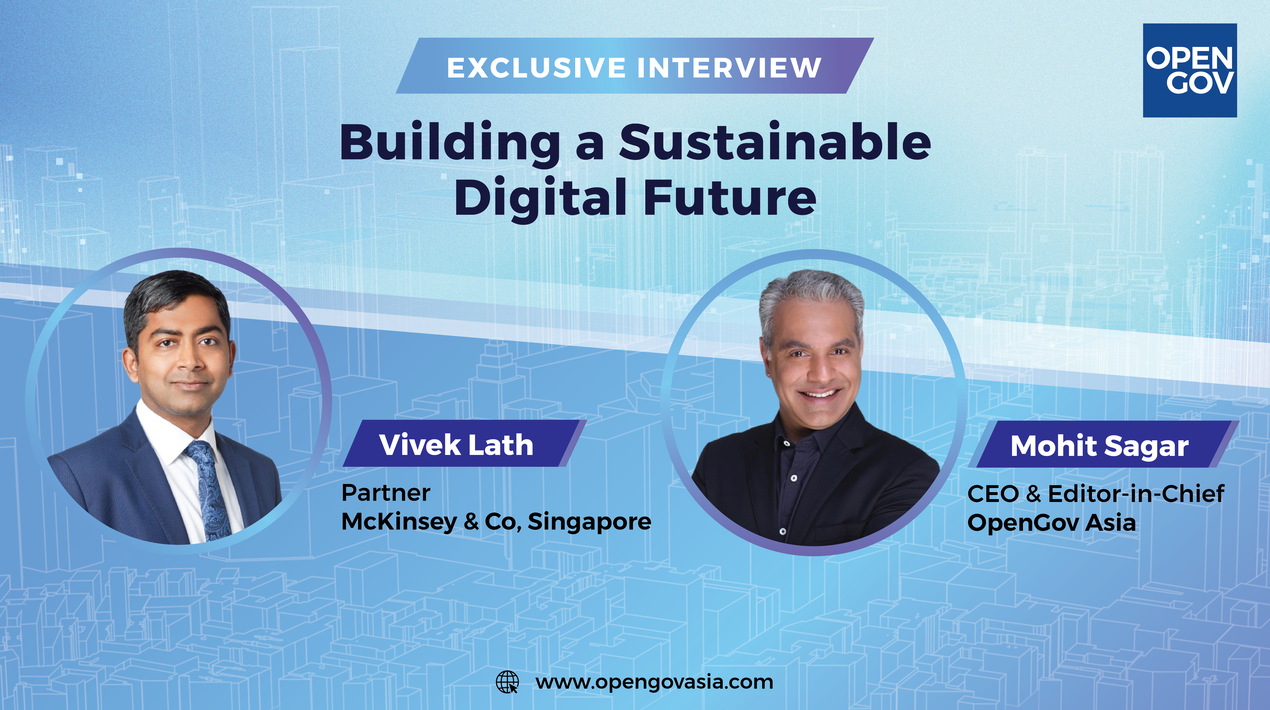
AI and other digital technologies could help solve some of the world’s most important social problems, like climate change, biodiversity loss, food insecurity and risks to public health, among others. Harnessing digital capabilities to promote a transformative system could be a game-changer for a sustainable and equitable global future.
Today’s consumers expect more than great products and services, and businesses are well aware of this. Clients want to feel like they are investing in a reputable, responsible brand. Consequently, the most market-dominant businesses are not merely profitable and have good products but those that have multiple alternate bottom lines – social, environmental and sustainable.
More than 90% of business executives agree that sustainability is crucial to their success. As consumer groups continue to publish reports on the increased desire for more environmentally friendly corporate practices, it is simple to see why green marketing strategies are gaining such importance.
The environment and sustainability are vital components in the strategy and operations of enterprises looking to be more conscientious. Organisations have been taking proactive steps to develop a greener future with their consumers, partners, stakeholders and workers. These efforts include environmental initiatives, community outreach efforts and business practices.
Advancing Environmental Sustainability and Resilience
 In an exclusive interview with Mohit Sagar, CEO & Editor-in-Chief of OpenGov Asia, Vivek Lath, Partner at McKinsey & Company, Singapore, acknowledges that climate change concerns have accelerated progress, such as the move from fossil fuels into renewables. Climate change and related critical events have helped people realise how severely irresponsible development affects the planet. And in this digital era, people are deploying cutting-edge solutions to manage global warming.
In an exclusive interview with Mohit Sagar, CEO & Editor-in-Chief of OpenGov Asia, Vivek Lath, Partner at McKinsey & Company, Singapore, acknowledges that climate change concerns have accelerated progress, such as the move from fossil fuels into renewables. Climate change and related critical events have helped people realise how severely irresponsible development affects the planet. And in this digital era, people are deploying cutting-edge solutions to manage global warming.
“Everyone is becoming aware of the necessity for action to attain sustainability,” says Vivek. “There is a growing interest in corporate sustainability and how corporations can strive for it to meet the needs of stakeholders for social, economic, and environmental implications.”
Most businesses are considering ways to contribute significantly, which will need robust investment and efforts. “We see businesses quickening their momentum and considering effective climate innovations. A case in point is how electric mobility companies can be affected by the huge reductions in costs for climate technology.”
Vivek believes it is possible to adapt a company’s digital strategy to mitigate and deal with extreme climate change. Companies must include digitalisation and decarbonisation in their strategy, as industry 4.0 technologies will play a crucial role in meeting the emissions reduction goal.
Digital technologies can increase energy efficiency and decrease fuel consumption across multiple industries and sectors. Digitalisation has the potential to revolutionise the way people and technology interact by helping to analyse and calibrate necessary interventions.
By utilising digitalisation, businesses can identify the emissions sources, whether at the product level, manufacturing unit level, or equipment level. They can then determine the necessary interventions to reduce emissions, such as a change in the manufacturing or personnel settings, and then monitor whether the identified interventions are being implemented.
“Here is where I believe digitalisation and decarbonisation must go hand-in-hand, as this will ensure that industries undergo structural changes and reach their objective,” says Vivek.
Businesses need to be more conscious of the need to be prepared for the energy shift, and he has five relevant steps for how businesses should approach this:
- Develop an understanding of how energy shifts will affect your company;
- Think about a bold and ambitious target, such as considering how big of a carbon footprint reduction they intend to achieve with this energy transition;
- Consider various situations and their effects;
- Create a comprehensive plan that will serve as an overall strategy with well-defined and cascading targets;
- Think about implementation, where companies strike a balance between all the goals, e.g., carbon footprint and profitability
Right now, society is more conscious of sustainability and is calling for companies to shift their carbon footprint and be more conscious about emissions. This is causing profound changes in the corporate and government landscape.
Organisations can work toward more sustainable practices with the aid of corporate sustainability’s economic, social and environmental pillars. Businesses must alter their mindset from just profitability at the expense of the environment to a sustainable and profitable paradigm. There must be interdependence and a greater emphasis on operations and eco-innovation.
Adopting sustainable practices benefits the environment, but businesses have also demonstrated that these programmes can boost productivity, lower costs, make shareholders happy, and a host of other advantages.
“Corporate entities must take the initiative in determining pertinent technologies. Companies must implement technologies to decrease their carbon footprint. They are the ones that will bring about change. Governments can decide the legislation, but unless companies change, it will be difficult to achieve net zero,” Vivek firmly believes.
A green economy is the practice of sustainable development supported by public and private investment in creating an infrastructure that promotes social and environmental sustainability. A green economy refers to an economy in which individuals are increasingly aware of their carbon emissions and are taking steps to reduce them.
A carbon footprint is the total amount of greenhouse gases, including carbon dioxide and methane, that corporations and individuals generate.
There are numerous practical and effective approaches to implementing sustainable technologies at the national level. “I believe that each country will deploy different technologies; the mix of technologies, the adoption rate, and the deployment cost will all be very different. However, each country will need to consider what sustainable technologies are relevant to them, consider implementing them, and consider the reasons for doing so.”
According to Vivek, decarbonisation entails significant economic transformation. When new business opportunities arise in Asia, companies must contemplate how they will be the first to take advantage. To do this, they must seriously consider the technologies and industries they want to innovate in or implement and the various business models they should use to take these opportunities.
There will be an acceleration of the energy transitions if individuals in the nation change their behaviour, the government considers how the empowering regulations should be made, or how businesses decide how they will operate.
Vivek has led several large-scale transformations and new business builds across the region, such as for an energy conglomerate in Indonesia. From this experience, he is convinced that a fundamentally different way of thinking about any business problem is required.
It requires thinking about what the unique value proposition is going to be and thinking about getting new talent to build a business from the ground up. Some of his most memorable moments on this journey include realising the value of having the right talent.
Another thing he learned is that customer preferences change at very different levels. So, thinking about the organisation’s unique value propositions and how customers perceive them becomes very important. For incumbents, choosing different business models can also be essential.
Both private and public organisations are aware that change needs to occur quickly. Resources are becoming harder to come by while demand is rising, necessitating a balance to build a sustainable future. “Green technologies will help the world achieve sustainable levels and make the environment cleaner and safer for everyone.”
Urban Ideas and Solutions Through LKYGBPC
Vivek is on the International Judging Panel (IJP) of the Lee Kuan Yew Global Business Plan Competition (LKYGBPC), a biennial global university start-up challenge held in Singapore.
As a member of the judging panel charged with driving, developing, and upholding the entrepreneurial spirit of the LKYGBPC participants, Vivek is focused on the innovativeness of the solutions, such as how effectively the technology solves the problem.
He also believes that feasibility and how the different technologies are correctly implemented can significantly change the world. “These two parameters will be quite useful in considering how we are selecting, or how I would select various technologies.”
He acknowledges that innovative entrepreneurship talent can be cultivated wider in the broader community through such competitions. These serve as an illustration of how they are fostering innovation and entrepreneurship across society.
The competition is also one example of instilling a culture where the next generation is thinking about how things can be done differently. Competitors explore creative ideas and have a forum where they can share their thoughts, which can be a great example of nurturing innovation.
The competition, which is run by the Institute of Innovation and Entrepreneurship at Singapore Management University (SMU), is centred on urban ideas and solutions developed by student founders and early-stage start-ups. It is positioned as a campus innovation movement that seeks to establish a global startup ecosystem with financial backers, including venture capitalists, corporate oligopolies, and governmental organisations.
“I believe many of our leading schools are doing a great job of instilling a culture where children are thinking about how things can be done differently and what are creative ideas,” Vivek opines.
There are numerous instances throughout the world where the technologies or solutions used by youth or larger communities have truly made a meaningful difference. “But it does take some significant effort to raise awareness and establish a forum where people can discuss their concerns, share their ideas, and obtain the resources needed to solve them,” Vivek concludes.
















